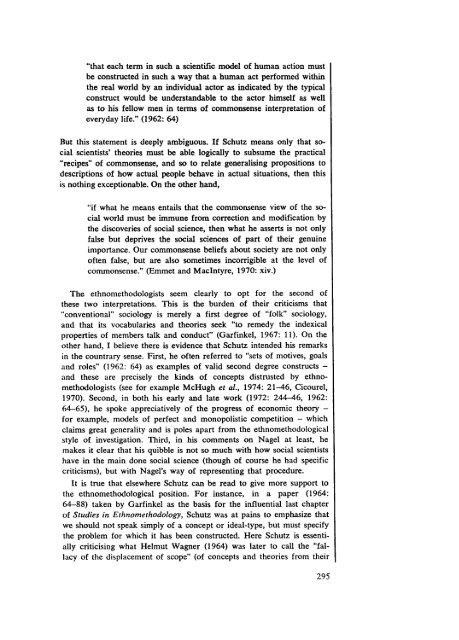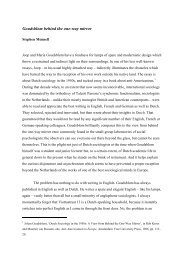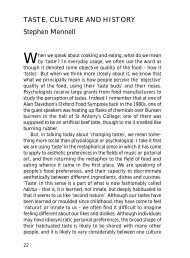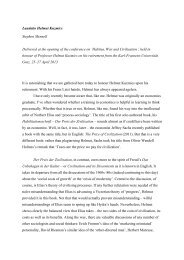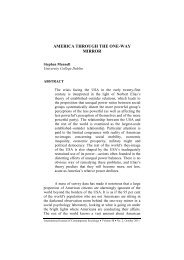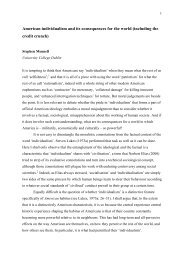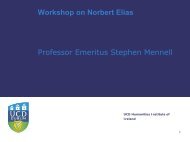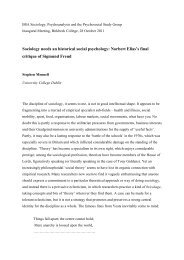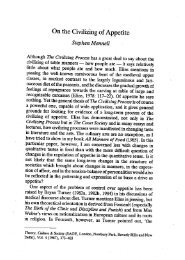Ethnomethodology and the New "Methodenstreit" - Stephen Mennell
Ethnomethodology and the New "Methodenstreit" - Stephen Mennell
Ethnomethodology and the New "Methodenstreit" - Stephen Mennell
Create successful ePaper yourself
Turn your PDF publications into a flip-book with our unique Google optimized e-Paper software.
"that each term in such a scientific model of human action mustbe constructed in such a way that a human act performed within<strong>the</strong> real world by an individual actor as indicated by <strong>the</strong> typicalconstruct would be underst<strong>and</strong>able to <strong>the</strong> actor himself as wellas to his fellow men in terms of commonsense interpretation ofeveryday life." (1962: 64)But this statement is deeply ambiguous. If Schutz means only that socialscientists' <strong>the</strong>ories must be able logically to subsume <strong>the</strong> practical"recipes" of commonsense, <strong>and</strong> so to relate generalising propositions todescriptions of how actual people behave in actual situations, <strong>the</strong>n thisis nothing exceptionable. On <strong>the</strong> o<strong>the</strong>r h<strong>and</strong>,"if wha-t he means entails that <strong>the</strong> commonsense view of <strong>the</strong> socialworld must be immune from correction <strong>and</strong> modification by<strong>the</strong> discoveries of social science, <strong>the</strong>n what he asserts is not onlyfalse but deprives <strong>the</strong> social sciences of part of <strong>the</strong>ir genuineimportance. Our commonsense beliefs about society are not onlyoften false, but are also sometimes incorrigible at <strong>the</strong> level ofcomnmonsense." (Emmet <strong>and</strong> Maclntyre, 1970: xiv.)The ethnomethodologists seem clearly to opt for <strong>the</strong> second of<strong>the</strong>se two interpretations. This is <strong>the</strong> burden of <strong>the</strong>ir criticisms that"conventional" sociology is merely a first degree of "folk" sociology,<strong>and</strong> that its vocabularies <strong>and</strong> <strong>the</strong>ories seek "to remedy <strong>the</strong> indexicalproperties of members talk <strong>and</strong> conduct" (Garfinkel, 1967: 11). On <strong>the</strong>o<strong>the</strong>r h<strong>and</strong>, I believe <strong>the</strong>re is evidence that Schutz intended his remarksin <strong>the</strong> countrary sense. First, he often referred to "sets of motives, goals<strong>and</strong> roles" (1962: 64) as examples of valid second degree constructs -<strong>and</strong> <strong>the</strong>se are precisely <strong>the</strong> kinds of concepts distrusted by ethnomethodologists(see for example McHugh et al., 1974: 21-46, Cicourel,1970). Second, in both his early <strong>and</strong> late work (1972: 244-46, 1962:64-65), he spoke appreciatively of <strong>the</strong> progress of economic <strong>the</strong>ory -for example, models of perfect <strong>and</strong> monopolistic competition - whichclaims great generality <strong>and</strong> is poles apart from <strong>the</strong> ethnomethodologicalstyle of investigation. Third, in his comments on Nagel at least, hemakes it clear that his quibble is not so much with how social scientistshave in <strong>the</strong> main done social science (though of course he had specificcriticisms), but with Nagel's way of representing that procedure.It is true that elsewhere Schutz can be read to give more support to<strong>the</strong> ethnomethodological position. For instance, in a paper (1964:64-88) taken by Garfinkel as <strong>the</strong> basis for <strong>the</strong> influential last chapterof Studies in <strong>Ethnomethodology</strong>, Schutz was at pains to emphasize thatwe should not speak simply of a concept or ideal-type, but must specify<strong>the</strong> problem for which it has been constructed. Here Schutz is essentiallycriticising what Helmut Wagner (1964) was later to caU <strong>the</strong> "fallacyof <strong>the</strong> displacement of scope" (of concepts <strong>and</strong> <strong>the</strong>ories from <strong>the</strong>ir295


